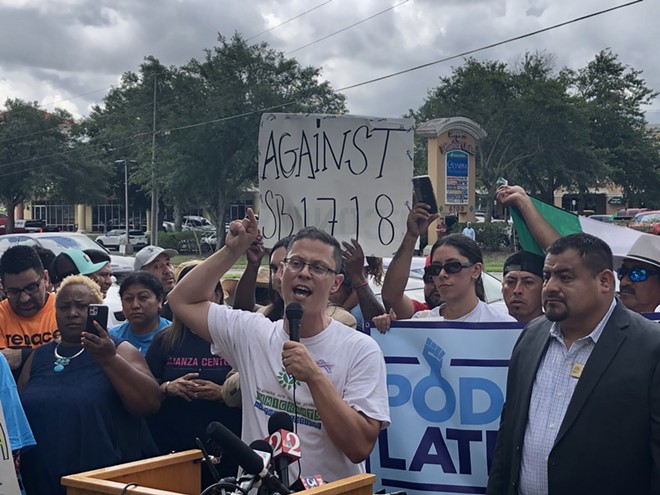McKenna Schueler
Felipe Sousa, executive director of Hope CommUnity Center, speaking at a protest demonsration in Orlando over a new Florida immigration law.
A line of trucks lined Conroy Road in Orlando on Thursday, bearing signs blasting a new immigration measure signed into law by Florida Gov. Ron DeSantis, who recently — finally — announced his campaign for U.S. President.
“We love FL, We live in FL, We fight for FL,” read a sign taped onto the side of one truck. “We came here to work, not to rob,” read another.
The line of trucks led up to a group of hundreds of immigrant rights advocates, including immigrant workers and their families, who rallied in Orlando as part of a statewide day of action in protest to SB 1718, a law that’s considered one of the harshest immigration measures in the country.
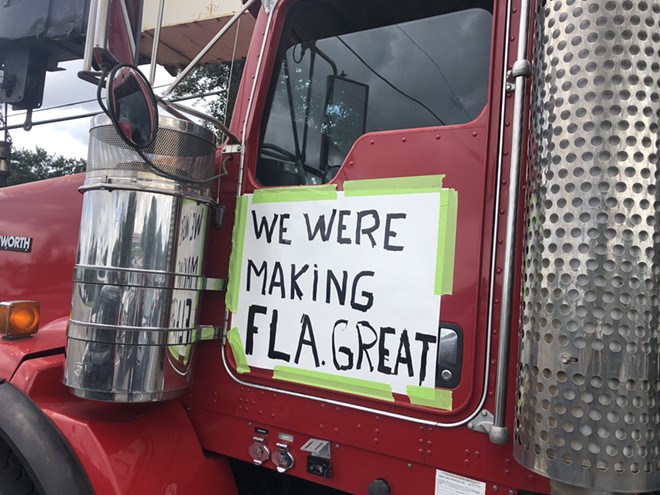
McKenna Schueler
An Orlando truck displays a sign in protest of a new immigration law championed by Florida Governor Ron DeSantis, as part of a national day of action.
Florida workers planned protest actions in at least six cities Thursday — from Orlando, to Jacksonville, Fort Myers, and the farmworker community of Immokalee — and some businesses also shut their doors in solidarity.
The statewide day of action (with some peaceful protests planned in other states) was inspired by social media posts by Latino truck drivers who, in mid-May, called on their fellow drivers to boycott Florida on June 1.
“This was an organic movement started by workers,” said Felipe Sousa, executive director of the Hope CommUnity Center, which serves 16,000 immigrant families per year from their home base in Apopka.
“This law was instated not because it was good for Florida, or because it was good for immigrants,” Sousa, himself a Brazilian immigrant, told Orlando Weekly. “It was only good for a few people’s political career.”
While Sousa didn’t name names, Gov. DeSantis is one Florida politician who is frequently lambasted for deploying performative political stunts to appeal to his right-wing base.
But other Republican elected officials, who ensured DeSantis’s political priorities made it through this past legislative session, have also been scrutinized by advocates.
The Orlando demonstration on Thursday was staged outside the office of Florida Rep. Carolina Amesty, an Orlando-area Republican who voted for the new immigration law.
Amesty, who has Venezuelan heritage, campaigned on targeting socialism and “illegal immigration,” according to Florida Politics, and has defended her position on the legislation.
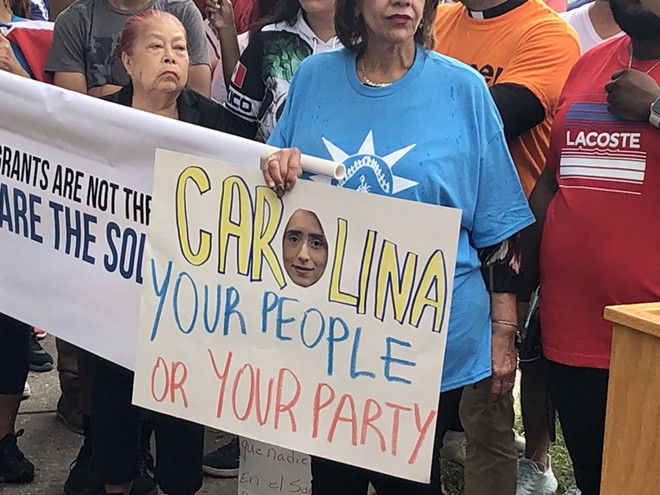
McKenna Schueler
An immigration rights advocate holds a sign protesting Florida Rep. Carolina Amesty’s support for a sweeping immigration bill that worries rights advocates.
Amesty’s office did not respond to an emailed request for comment prior to publication.
SB 1718, signed into law last month, has garnered national attention as one of the harshest immigration measures in the country, targeting undocumented people specifically as well as the businesses that employ them.
“This bill would make them a felon if they drive their mom or auntie or grandmother or a sibling for a simple road trip.”
tweet this
Among other things, the measure requires employers with more than 25 employees to use E-Verify to verify a worker’s legal status, imposes penalties for violations, bars undocumented people from practicing law, and forbids local governments from issuing community IDs to undocumented people.
The law also forbids transporting undocumented migrants into the state of Florida — a major point of concern among family members, social service organizations, and loved ones of undocumented people.
According to Sousa, family members are particularly concerned that even going on a family trip could be considered a violation of the law and therefore risk a fine of up to $10,000 and 15 years in prison.
“This bill would make them a felon if they drive their mom or auntie or grandmother or a sibling for a simple road trip,” said Sousa. “And then upon returning, they could face up to 15 years in jail.”
Another big concern is a provision of the bill that requires hospitals that receive state and federal Medicaid dollars to track how much money is being spent on caring for people who are undocumented.
An earlier version of the legislation, since watered down, would have required those hospitals to also ask patients if they are in the country legally.
Now there’s an option to decline to answer, according to Sousa, but fear among undocumented people and their loved ones has already spread.
A group of 80 healthcare providers in April expressed concern that this provision of the law would deter undocumented people from seeking treatment for illness or injury.
The law also bestows a special favor on DeSantis: It allocates $12 million additional tax dollars to expand the governor’s migrant relocation program.
That program was heavily scrutinized last year after DeSantis used Florida taxpayer dollars to fly mostly Venezuelan asylum seekers from Texas to Martha’s Vineyard as part of a political stunt.
Critics say the law is designed to terrorize undocumented people and their families, and could also hurt businesses that employ them (although who’s hurt the most is yet to be seen, but we can guess).
The law has received pushback from a range of social advocacy and immigrants rights groups, including business groups like the American Business Immigration Coalition, as well as labor unions that represent thousands of immigrant workers.
Immigrants make up more than one-quarter of Florida’s workforce, and make up one-half of the state’s agricultural workforce, according to the American Immigrant Council.
The new law will affect families and neighbors who work in agriculture, construction, manufacturing, public works, and every other job (often literally) under the sun that keeps communities running — or entertained, in Central Florida’s tourism industry.
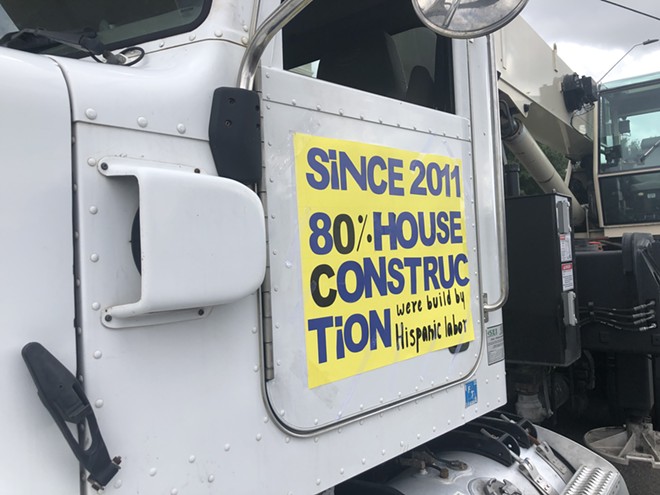
McKenna Schueler
A truck displays a sign in support of immigrant workers in Florida at a demonstration staged in Orlando.
Republicans have denied that the Florida law will negatively affect businesses that employ immigrant workers, despite photos and videos circulating of seemingly abandoned worksites.
Critics also warn the law, while directly targeting undocumented people, could have sweeping effects on the lives of all Floridians, not just immigrants and not just those who are undocumented.
“Passing these radical and extremist anti immigration laws are harmful to every citizen in Florida, and every person in Florida,” said Jeremy Rodriguez, a Mexican American youth leader with the Hope CommUnity Center who also works for U.S. Congressman Maxwell Frost, D-Florida.
“Immigrants, we get the job done,” Rodriguez told the crowd of men, women, and children gathered outside of Rep. Amesty’s office.
“It’s time we fight for our freedoms against this big government that wants us to live in fear,” he proclaimed. “We are proud of where we come from. We are proud of who we want to love,” said Rodriguez, referencing anti-LGBTQ legislation that DeSantis has also signed into law.
“We are proud to make our communities better and this country better.”
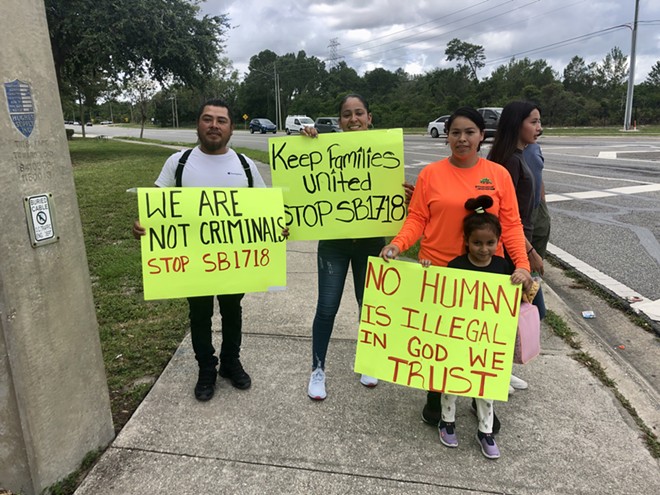
McKenna Schueler
A family attends an Orlando demonstration against an immigration policy described as one of the harshest in the country, targeting undocumented people.
Dozens of immigrants held signs of protest and solidarity in English and Spanish.
“What about personal freedom and limited government?” one sign read.
“Immigrants are key to Florida’s growth,” read another. “I’ve been building America since 1998,” read yet another.
The statewide day of action came after an estimated 3,000 people rallied last week in Homestead, a city in South Florida that formerly housed an ICE detention facility.
The Orlando demonstration, sizable as it was, didn’t go unnoticed.
As the 11 a.m. press conference went on, local law enforcement began quietly wading through the energetic crowd. There was no shoving, pushing or commotion — just curious side-eyes from some onlookers.
By noon, no less than a dozen Orlando Police Department cruisers were parked along Conway Road. No cops on the scene would talk to Orlando Weekly, or explain their presence.
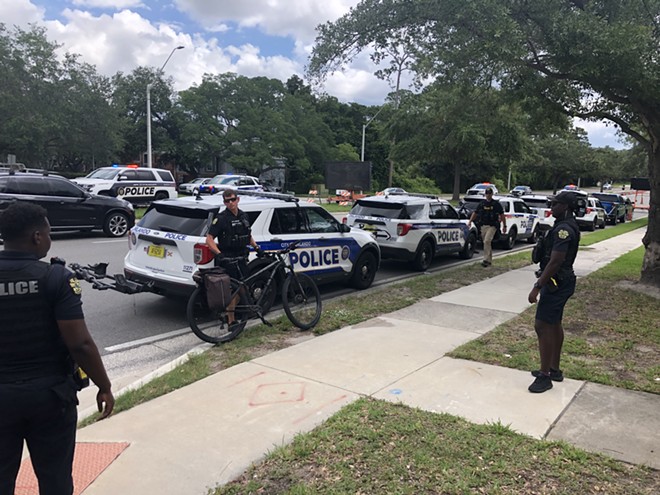
McKenna Schueler
Orlando police cruisers line Conway road in response to traffic complaints tied to an immigrant rights demonstration.
Andrea Otero, spokesperson for OPD, told Orlando Weekly over email that the cops were called to the scene to handle “traffic impacts” the demonstration was having.
According to organizers, demonstrators were also allegedly told to get off the property where they’d gathered (again, no cop on the ground would confirm this to Orlando Weekly at the time), and to move across the busy six-lane road to a different business plaza.
Otero denied that this was OPD’s doing, telling Orlando Weekly, “At no time were demonstrators asked by police to leave the area.”
“The crowd dispersed without incident,” she added.
Some described Thursday’s statewide day of action as a “boycott” or “strike,” calling on workers to withhold their labor for the day, in solidarity with immigrant communities.
Multiple businesses in Central Florida, such as El Rey Supermarket in Apopka and QuesaLoco in Orlando, did reportedly shut their doors, in solidarity with the call to action.
But going on strike, or halting business for a day, is not an expense everyone can afford — nor is a massive strike an easy action to organize.
Workers in Florida’s public sector (teachers, city employees and more) are barred from striking under state law, and could lose their jobs (and job credentials) for doing it. Many private-sector union contracts, including contracts covering Disney World workers, also prohibit striking.
Sousa, with the Hope CommUnity Center, said their call to action locally is for community members to join the movement: stand up for and advocate for your immigrant friends and neighbors.
After the rally, the Orlando group planned a canvass through the neighborhoods in Rep. Amnesty’s district to inform constituents of her vote on SB 1718.
They’ll also be passing out information informing folks of their rights, since many of her constituents, per Sousa, could be directly or indirectly affected by the immigration measure.
“This law is, quite honestly, unconstitutional, inhumane,” said Sousa. “We have no other choice but to hold accountable those who have harmed our community.”
Orlando Democrat Anna Eskamani, meanwhile, expressed solidarity with those joining the statewide day of action.
“Immigrants are the backbone of our state economy and are essential to the health and success of our state,” State Rep. Eskamani, a daughter of immigrants, shared in a statement.
“It is disgusting to demonize and target a community for political gain which is exactly what Governor Ron DeSantis has done and is doing.”
Subscribe to Orlando Weekly newsletters.
Follow us: Google News | NewsBreak | Reddit | Instagram | Facebook | Twitter

